What is going on Kittystead readers? Today we are going to cover a very important topic – cat diets and eating habits. We at Kittystead do not have our furbabies on a regular, timed, feeding schedule and it shows on a few of them. We are getting a little concerned about one of our love’s weight and want to adjust our kiddos’ eating habits for the greater good of the group. The trick is how to control 9 furbabies that are very vocal when there is a hole in their food.
This post contains affiliate links. We may earn compensation when you click on the links at no additional cost to you.
We have always had the cat food available twenty-four seven for them because a lot of them eat at a strange time, some just grab a kibble here and there, and then there is Cadabra aka Moo Moo that spends a good portion of her time eating to her heart’s content. Now while we love our chonky cat and other chonky cats out there, we feel it is not good for her health and, sadly, now she is having a harder time cleaning herself.
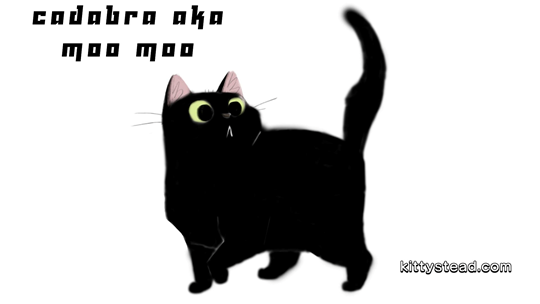
Now you might be asking yourself, why should it matter if she is happy, right? Research shows a cat being as little as two pounds above their ideal body weight can put that cat at risk for developing some serious medical conditions. Unfortunately, when a cat is overweight or obese he/she no longer has the question of if they will develop a condition secondary to the excess weight, but how soon and how serious. (just like us humans) Here are just some of the complications that overweight cats might face: type 2 diabetes, heart disease, arthritis, increased frequency of joint injuries, high blood pressure, and some forms of cancer. We love our Cadabra too much to see here get ill like that so that is why we have decided to step up and do something about it.
Below we are going to go over some of the things we have researched and some of the tactics that we are going to try. If any of these have great success we will write a second article about Cadabra’s progress and which diet is working the best for our nine cats here at Kittystead. We recommend talking with a vet before getting started with any changes – just like us humans need to ask our Doctor questions and get approval before a major food or activity level change, it’s best to talk with your vet first. This way you can get the exact number of calories, and make sure this is done with extreme safety measures. A cat’s physiology is different than humans or dogs and if they do not eat for as little as two consecutive days, they can develop a life-threatening form of liver disease known as hepatic lipidosis or in laymen’s term Fatty Liver Syndrome. Saying it one more time for the people in the back. Please consider 1st going to your vet for a plan, accurate weight (current and goal), and advice. Restricting a cat’s diet can be very dangerous to your furbaby.
Wet food or dry food?
For many cats, the best way to lose weight is with a canned diet food fed several times per day, rather than leaving food down all the time. One of the reasons canned diet foods work better is because finicky felines often prefer wet food to dry. Eating meals rather than nibbling all day long discourages eating out of boredom or just for the sake of eating. It is vital that you count calories and measure the amount fed when entering a weight reduction program. Feeding too much will result in no weight loss and feeding too little can result in serious health consequences such as hepatic lipidosis.
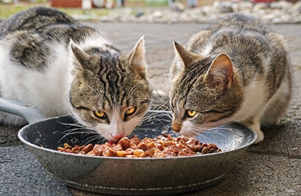
How fast should you be introducing a new diet to your cat?
After tons of personal research, we decided the plan that made the most sense for our furbabies was to allow three to four weeks for the transition. First, offer small amounts of the new diet in a separate bowl. If your cat(s) is a finicky eater it may take 2-3 weeks for your cat to decide to eat it. Next, slowly start removing the regular food for more diet food, do this for a few days. Moving on, now it’s time to remove even more of the regular – do this for a few days. Finally, remove all the food that is not diet food. Now, these steps are for switching to a low calorie “diet food” but, note, this is also for switching to times feedings versus having food out all the time or just when you furbaby “yells” at you, it is time for him/her to eat. Or does that just happen to us?
Homemade food will be better for my furbaby?
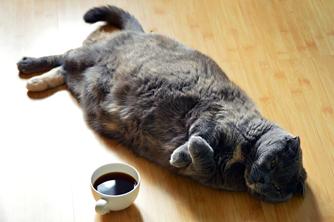
If you decide to prepare food for your cat, you should talk to your vet about ensuring a balanced diet. Foods you buy are formulated to carry the nutrients essential for your furbaby’s health, and the odds of homemade food meeting all your cat’s needs are very slim. Your vet may suggest vitamins or supplements for a balanced diet. So overall we think this option is out. The main reason is, have you ever tried to give your cat medicine? Pill or liquid, it does not matter. If your furbaby is anything like our nine then it will be a real chore.
Why Vegetarian/Vegan Diets Aren’t Appropriate for Cats.
While researching cat diets, we came across someone that was talking about how great a vegetarian or vegan diet is for cats. Our first thought is we disagree with this as cats are carnivores. Cats need protein that is derived from animal tissue. While it is true that some vegetables, as well as other food sources, do offer protein content, a cat’s digestive system isn’t designed to digest and metabolize these foods the way a human can. Therefore, in our opinion, a vegetarian or vegan diet is not suitable for your furbaby.
More research revealed, according to the ASPCA, taurine is an essential amino acid that ensures the normal function of a cat’s eyes, cardiovascular system, and reproductive system. It’s found exclusively in animal tissue. Cats can’t synthesize taurine, so this is another reason cats need to eat a diet based on animal protein rather than a vegetarian/vegan diet.
Raw food hype?
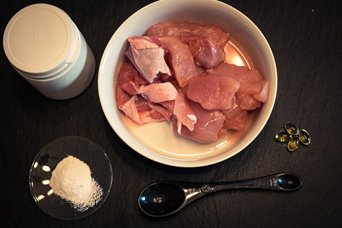
The internet is filled with opinions, some good, some bad about raw food. We have seen locally and elsewhere online all about switching to a full natural diet of raw meat. We could be completely wrong on this subject, but we think a domestic cat’s stomach will not be able to handle just raw food. Although we have never followed any outdoor cats to see how they’re doing after their raw meal so, at best, an educated guess. Although it is very common to see outdoor cats have toxoplasmosis from eating infected rodents and such – we know that is bad. Raw meat may contain pathogens that are harmful to pets and people. Dogs fed raw meat can shed pathogens in their stools. (So, it is possible a cat could too.) Many of these pathogenic organisms are resistant to antimicrobials, which are designed to kill microorganisms or at least inhibit their growth. If you still like the idea talk to your vet for their opinion.
Well after much research on everything, on which diet would be best for our furbabies. We feel our best choice is the wet food diet, as it has fewer carbs and will still carry the nutrients that our furbabies depend on. We love our cats and we are sure you do as well which is why we only try to give the best and take care of them. We hope y’all enjoyed today’s blog.
What are some diet plans you have tried and liked for your furbaby?
Let us know in the comment section. Be sure to sign up for the Kittystead newsletter for more tips, updates on upcoming blogs, and so much more.
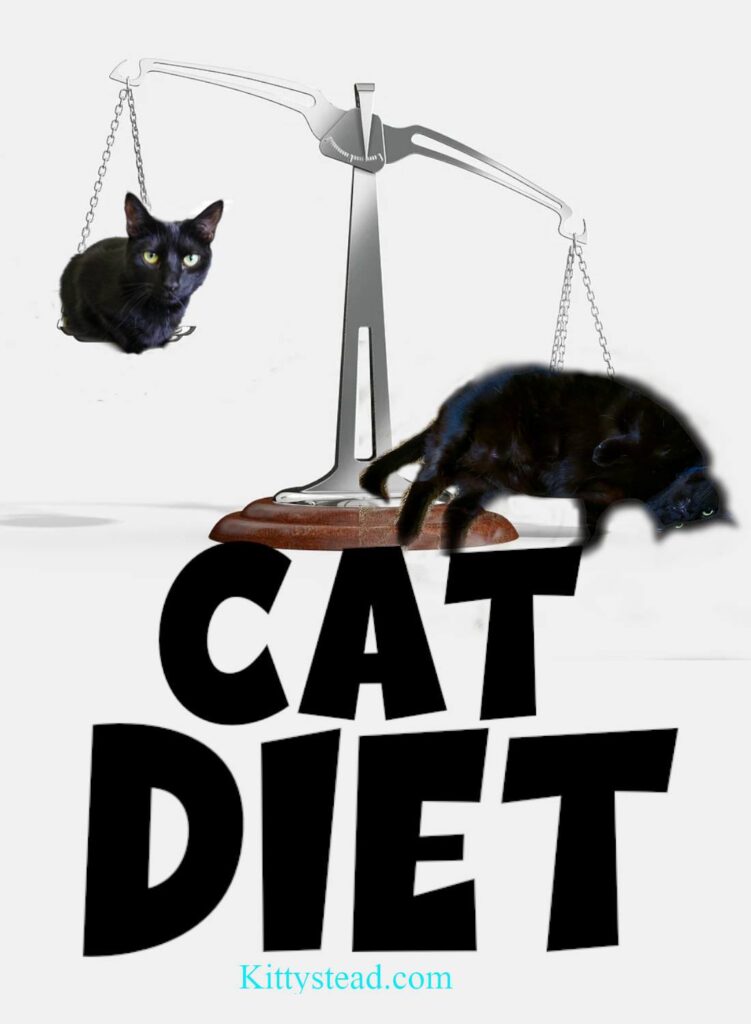

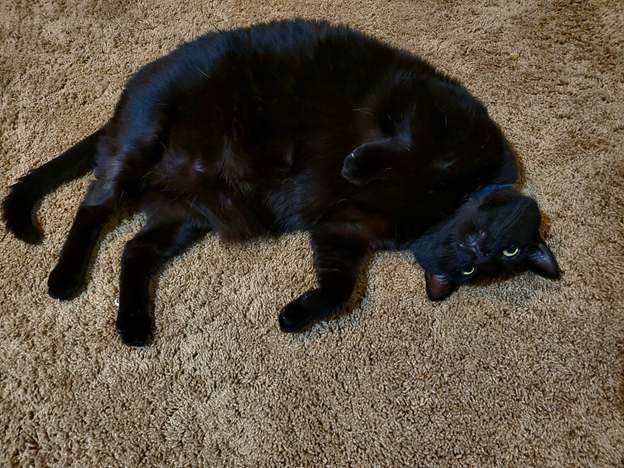

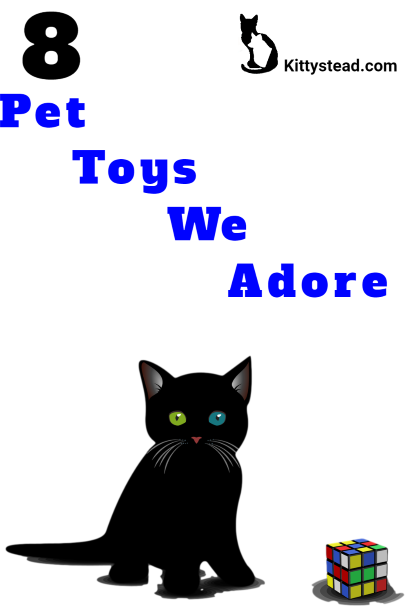

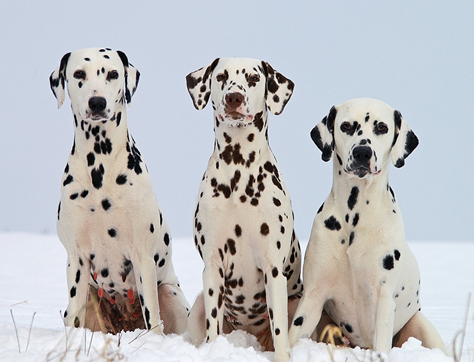

One of our cats is overweight. We’ve started her on feeding mice to try and keep her food portion controlled. Thankfully she seems more interested in eating from the mice than from the bowls that we do leave food in for our other cats. However, it’s been about a month and we haven’t seen any weight loss. Time to start figuring out an exercise regimen. It’s not easy to get one cat to lose weight when all your other cats are fine.
Great advice, diet is something I always stress out about with my fur babies. My childhood cat went into kidney failure in her last bits of life and I am so paranoid about that happening with my young kitties. I am always on the lookout for good food brands or healthy treats to introduce to their diets.
Hi Kittystead. Great post and I definitely can relate to finding the right diet for your cats. I have two and I have to buy their food from the vet to support kidney health. You don’t want your cat to get a UTI!!!
Love this article! One of our kitties loves to eat and is always meowing for more food. We worry that he’ll gain weight and fortunately, he hasn’t yet. I wonder if you have any tips for a cat that’s always asking for food and how we can help him out without risking weight gain?
We recommend double checking your furbabies weight and age to first see if they are actually hungry. lol Out of our 9, a few are beggars and always vocal when we have food. One has a great deal of energy and does eat more than the others and seems to be the smallest. You may wish to up the food a tiny bit and pay attention to any weight gain as even 1-2 pounds can cause damage. Another thought is to change food or add a wet cat food or something different that has more flavor or add treats (more protein less carbs to feel full) to let them get better pleasure from their food.
Great information! I have a fat cat and she’s on weight control food but I think it’s the lack of exercise. We have a new puppy so maybe running and hissing at him will help shed some weight. Love your stuff!
Helpful post! Thanks for putting this together